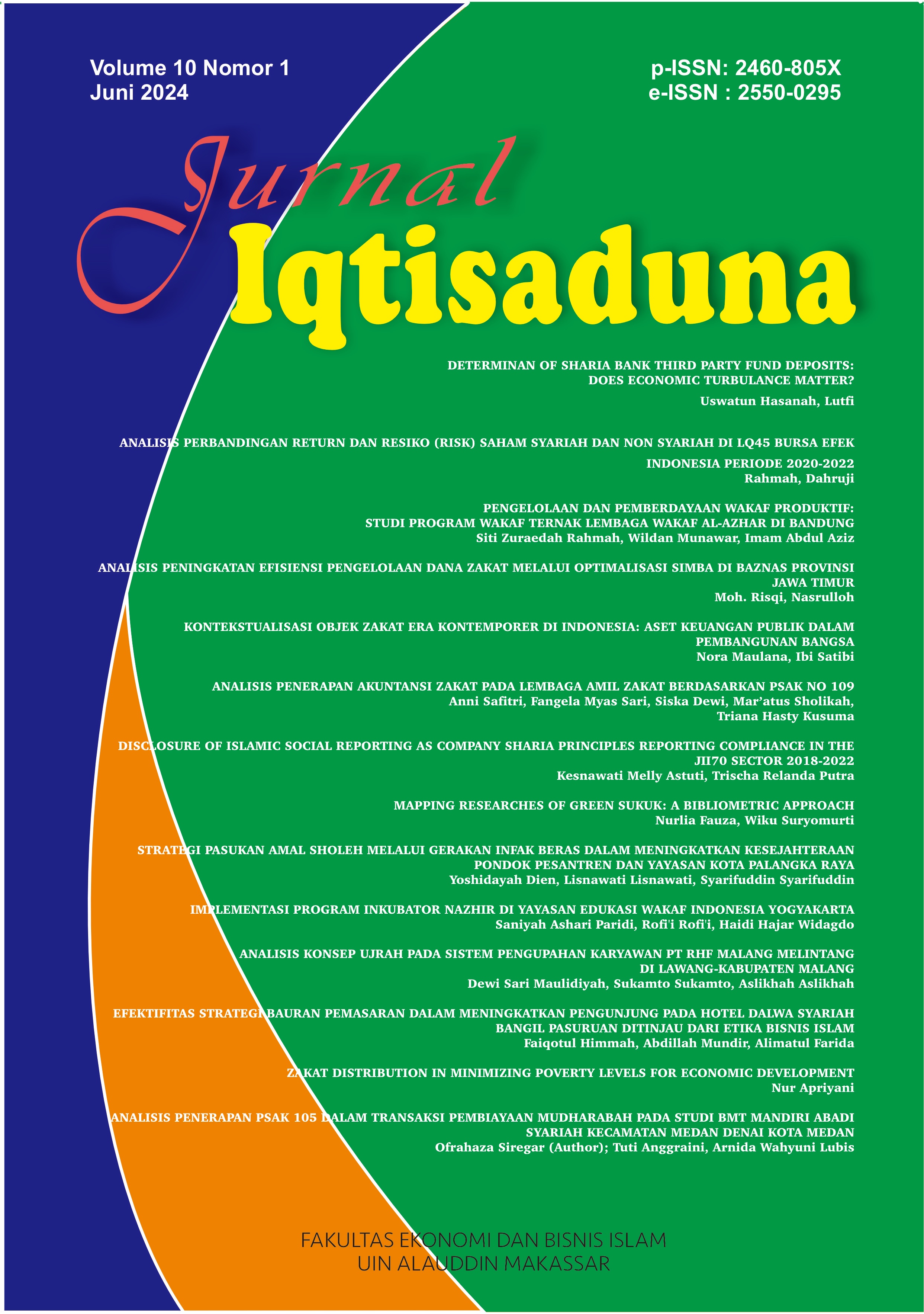Implementasi Program Inkubator Nazhir di Yayasan Edukasi Wakaf Indonesia Yogyakarta
Abstract
This research was conducted to analyze the implementation, management of Human Resources and the problems of the Nazir incubator program. This research is a type of qualitative research with a descriptive nature. The type of research used in this research is Field Research, or field research. The research was carried out at the Indonesian Waqf Education Foundation (YEWI). The data sources in this research come from primary data obtained from all informants related to the management of the Nazir incubator and secondary data obtained from various existing sources such as books, reports, and so on. The first stage of the data analysis technique is collecting data from various sources and relevant research results. After the data is collected, the next step is data reduction, where significant information is identified and separated from the irrelevant. This process ensures that only essential data is retained for further analysis. After data reduction, the data presentation stage begins. It involves careful interpretation of the reduced data and presentation of the information in the form of clear and scientific words or sentences. It is important to present data objectively, without hiding any shortcomings or ambiguities that may exist. Finally, conclusions are drawn based on data reduction and information presentation. The incubator program in the waqf program is designed to create professional nazhir candidates with the aim of creating the potential for nazhir candidates to develop skills in waqf management. In the context of resource management, the Nazhir incubator program is designed to assist Nazhirs in managing resources related to the waqf they handle, so that all existing resources become much more organized, starting from administration to collecting cash waqf.
Downloads
References
Aminullah & Ali. (2020). Perkembangan Teknologi Komunikasi Era 4.0. Komunike, Volume XII, 1–23.
Baharuddin & Iman. (2018). Nazir Wakaf Profesional, Standarisasi dan Problematikanya. Li Falah: Jurnal Studi Ekonomi Dan Bisnis Islam, 3(2), 62. https://doi.org/10.31332/lifalah.v3i2.1197
Bamford & Xystouri. (2005). Managing Service Quality : An International Journal Article information : Managing Service Quality, 15(3), 306–322.
Barat, 58197-ID-peran-nazhir-dalam-pemberdayaan-wakaf-ti.
Ali Nurdin. (2017). Manajemen Sumber Daya Manusia.pdf (p. 123).
Iswanto. (2017). Kompetensi, Profesionalisme Kerja Dan Kinerja Karyawan. Jurnal Ilmu Administrasi Negara, 14(2), 184–191.
James W, Elston D, et al. (20 C.E.). 済無No Title No Title No Title. Andrew’s Disease of the Skin Clinical Dermatology., 12–30.
Ningsih, Karyanto, Utami, Sululing & Hatta. (2021). Manajemen Sumber Daya Manusia.
Oktakusuma & Jannah (2022). Problematika Guru Pendidikan Agama Islam dalam Pelaksanaan Kegiatan Pembelajaran di SMPN 2 Tanjunganom Nganjuk. 15–35.
Ridwan. (2012). Nazhir Profesional Kunci Kesuksesan Wakaf Produktif. Muqtasid: Jurnal Ekonomi Dan Perbankan Syariah, 3(1), 91. https://doi.org/10.18326/muqtasid.v3i1.91-109
Sitorus, Machfud & Anggraeni. (2023). Strategi Pengembangan Inkubator Bisnis Dalam Pendampingan Bisnis Usaha Mikro, Kecil, dan Menengah (UMKM). Jurnal Aplikasi Bisnis Dan Manajemen, 9(3), 987–997. https://doi.org/10.17358/jabm.9.3.987
Soba, Hasbullah & Nuryartono. (2018). Strategi Pengembangan Inkubator Bisnis Sebagai Lembaga Pendampingan Perusahaan Pemula : Studi Kasus Inkubator Bisnis IPB The Development Strategy of Business Incubator as a Newbie Starter Company : Upaya mendorong kewirausahaan di Indonesia. Jurnal Aplikasi Manajemen Dan Bisnis, 4(1), 96–105.
Utomo, Masyita & Hastuti. (2020). Why cash waqf fails to meet the expectation: evidence from Indonesia. Indonesia’s Financial Services Authority (OJK) Research, October, 1–23. https://ojk.go.id/id/data-dan-statistik/research/working-paper/Documents/WP-20-02.pdf
Wajdi, Mangifera & Isa (2021). Strategi Penguatan Inkubator Bisnis Dalam Pengembangan Usaha Kecil Dan Menengah. Jurnal Manajemen Dayasaing, 22(2), 101–107. https://doi.org/10.23917/dayasaing.v22i2.12720

